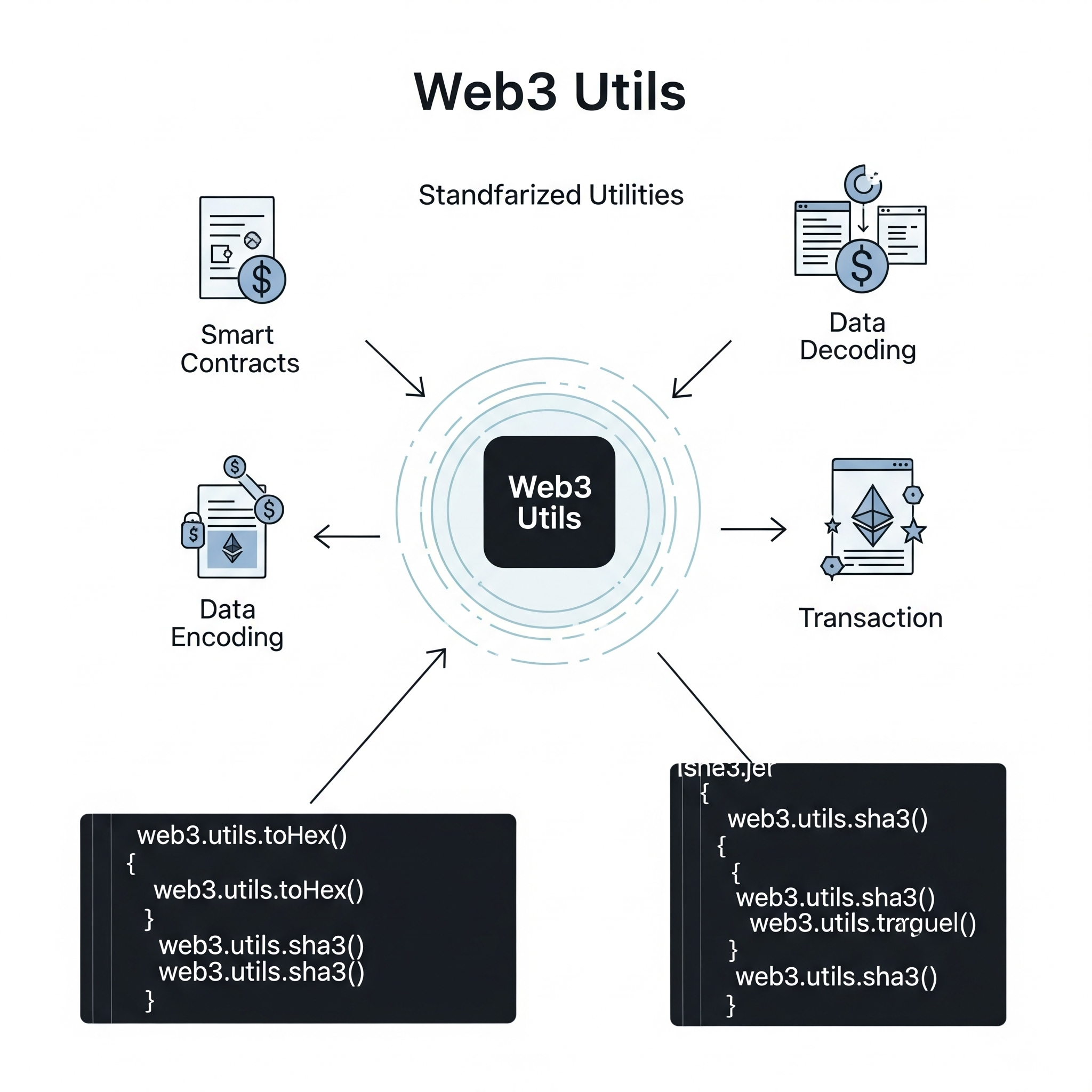What Is web3 utils?

One essential package in the web3.js JavaScript library is the web3 utils module. Its main responsibility is to offer a standardised implementation of common utility functions that are necessary for Decentralised Applications (DApps) to use consistently. It streamlines a number of intricate data conversions and manipulations required while working with the Ethereum blockchain, particularly guaranteeing uniformity throughout participants.
Along with core, eth, net, providers, and shh, the web3.utils package is one of the six primary packages that make up the web3.js API. It provides several features to help Decentralized Application(DApp) developers.
Web3.utils functions
The features offered by web3.utils are broken down as follows:
Functions for Hashing
- SoliditySha3(): Determines the SHA3 hash of the supplied input parameters following tight packing and ABI conversion. This is very helpful for activities like creating messages for micropayments.
- Sha3(): Produces a SHA3 hash for a literal string input.
- Keccak256() is a sha3() alias that is also used to sign arbitrary message hashes.
Also Read About Advanced Web3 eth Contract Programming & Best Practices
Conversions between numbers and units
- An ether value can be converted into its smallest unit, Wei, using the toWei() function.
- FromWei(): Returns Ether from Wei.
- Use toNumber() to convert 256-bit numbers like the blockchain’s highestBid to 64-bit numbers for the user interface.
- ToHex() automatically converts any value to hexadecimal.
- All conceivable Ether values and their corresponding amounts in Wei are displayed in the unitMap.
- BN(): A JavaScript function for handling large numbers.
- IsBN(): Verifies if a specified value is a BN.js instance.
- IsBigNumber(): Verifies if a specified value is a BigNumber instance.J.S.
Hexadecimal String and Address Utilities
- IsHex() tests strings for hexadecimal.
- IsHexStrict() checks if a string is 0x hexadecimal.
IsAddress(): Checks to see if a string provided is a legitimate Ethereum address. - An uppercase or lowercase Ethereum address can be converted to a checksum address using the toChecksumAddress() function.
- This function checks an address’s checksum.
- AsciiToHex() converts ASCII strings to hex.
- HexToBytes(): Converts hex strings to bytes.
- ByteArrayToHex(): Converts byte array to hex string.
- PadLeft(): Helpful for hexadecimal strings, this function adds padding to the left of a string.
- PadRight(): This function, which is also helpful for hexadecimal strings, adds padding to the right of a string.
- A negative number can be transformed into its two’s complement using the toTwosComplement() function.
Generated at Random
RandomHex(): Produces pseudo-random hexadecimal strings with a given byte size that are cryptographically robust.
Other Functional Helpers
_(): Offers more specialised features like function binding, JavaScript templating, fast index creation, and deep equality testing in addition to everyday functional helpers like map, filter, and invoke.
Importance and Application
The web3.utils module is essential due to the following reasons:
Consistency
All DApp participants must be able to perform actions on the blockchain node, such as converting hexadecimal integers or Ether to Wei, consistently. This consistency is ensured by using web3.utils.
Data handling
While standard web apps frequently run on 64-bit servers, Ethereum uses 256-bit values. The utilities required to correctly perform these conversions are provided by web3.utils, avoiding potential errors or loss of precision that could arise from using ordinary JavaScript number types.
Simplification
DApp developers may concentrate on application logic rather than sophisticated blockchain mechanics by abstracting away complex low-level procedures, such hashing and cryptographic conversions, into user-friendly functions.
For instance, web3.utils is widely used in the Micropayment Channel (MPC-Dapp) to:
- Get the specifics about micropayments with web3.utils.soliditySha3().
- Use web3.utils.toWei() to convert bitcoin values to the smallest unit, Wei.
- Execute internal cryptocurrency conversion calculations while making sure they adhere to the blockchain’s specifications.
Also Read About Blockchain Hashing Explained: Core Of Security And Integrity
In conclusion, web3.utils is a complete toolkit that makes DApp development dependable and strong by standardising and streamlining the processing of diverse data kinds and cryptographic operations.
